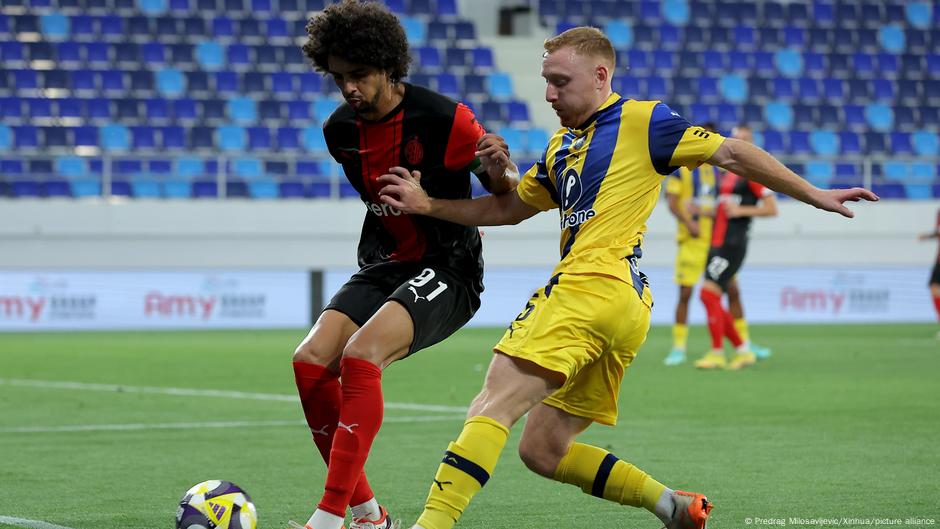Though Maccabi Tel-Aviv’s name comes first on UEFA’s fixture list, neither they nor opponents Dinamo Kiev will be playing at home in their two-legged Europa League qualifier over successive Thursdays in August.
While the clubs play domestic matches in and respectively, European football governors UEFA have deemed the countries unsafe for continental competition. As a result, the first leg on August 21 will be played in the TSC Arena in Backa Topola, Serbia, as were their previous European games this term. The team, like many other Israeli sporting clubs, has also played in Belgrade, with Serbia becoming a home away from home.
Marko Begovic, an associate professor in sport management at Molde University in Norway and author of the book “Sports Policy and Politics in the Western Balkans” told DW there were three main reasons why Serbia ticked the necessary boxes.
“Firstly, Serbia enjoys stable diplomatic relations with Israel and has a tradition of cooperation that makes such an arrangement politically viable. Second, Serbia maintains relative neutrality, exercising political ambiguity in these conflicts (the Middle East and Russia-Ukraine) and Belgrade represents a politically acceptable compromise in this regard. And the third is that Serbia possess the necessary sporting infrastructure.”
Are sporting bans the answer?
and Begovic said that, given the long-term policy aim of neutrality in international affairs, and the fact the population is much more concerned with the than the one between Israel and Hamas, there are few objections to hosting Israeli teams.
“If you look at the wider region, other republics of former Yugoslavia have been hosting Israeli clubs, not only in football, but in basketball as well. So it is not an issue. I would say this is part of institutional memory of the former Yugoslavia,” he said.
Part of that institutional memory is based in antipathy towards sporting sanctions for pollical or military actions. Yugoslavia, of which Serbia was a part, faced an almost total sporting ban in the early 1990s, which took in the , the football World Cup and all manner of other competitions.
Russia is currently banned from all UEFA and FIFA tournaments but their national football team continue to play friendlies, generally against teams less hostile to their invasion of Ukraine, and Serbia. The country is also banned from the Olympics, though some of their athletes compete under a neutral banner, and from a host of other international sporting competitions.
Ukrainian sides like Dynamo Kiev are free to compete in most sports and will host the second leg at the Lublin Arena in Poland, with Ukraine’s European club competition entrants playing at various venues across Europe.
Is UEFA becoming more political?
is recognized by FIFA and the athletes more broadly by the International Olympic Committee. Similarly Israel, as it stands, is still an active participant on the international sporting stage and will, for example, send a team to basketball’s Eurobasket tournament that starts in September. The country sent a team to the Paris Olympics in 2024 and is to send athletes to the Winter Olympics in 2026.
But a banner reading “STOP KILLING CHILDREN – STOP KILLING CIVILIANS” was endorsed by UEFA and held up by victims of current conflicts, including Palestinian children, at the recent UEFA Super Cup match between and Tottenham Hotspur in Udine, hinting at a more intense spotlight in the world’s most popular sport.
“For now, this is our decision. It is very difficult for me to comment on what could happen in the future,” UEFA President Alexander Ceferin said in an interview with Slovenian public TV station Odmevi the day after the match, opening the door in the eyes of some for a potential ban. He added that the “issue of Israel’s participation in UEFA competitions is a legitimate question.” But Ceferin also re-iterated that “in principle, I am not an advocate of not allowing athletes to compete,” saying that the Russia ban had made little material difference.
It’s a position Begovic shares.
“There has been a very selective approach in sanctioning and banning in sports,” he explained. “But either way, the (Ukraine) war is not any closer to an end. The same goes for other war zones. Banning and sanctioning sports will not bring wars to the end. Sports has a limit in that regard. I think sometimes we are expecting too much from sports.”
Must sporting chiefs take sides?
But, for some, including the EU’s sports commissioner, Glenn Micallef, allowing Israel to remain on the global sporting stage while they continue to exacerbate the dire situation in Gaza, is avoiding the issue.
“When it comes to sports, I think there should be no space in sporting events for those who do not share our values,” he told Politico, without directly naming Israel.
“Sport is a tool that we use to promote peace, through which we promote human rights.”
One could argue that this reading of sport’s place within politics has been mostly absent in deed, if not in word, in recent years. Within the last two decades, football’s World Cup has been hosted by Russia and Qatar, while Russia and China have hosted Olympic Games. In a world of significant geopolitical challenges, sporting organizations are increasingly forced into political decisions that most would rather avoid.
Edited by: Chuck Penfold
The post Why are Israel’s football clubs playing in Serbia? appeared first on Deutsche Welle.




